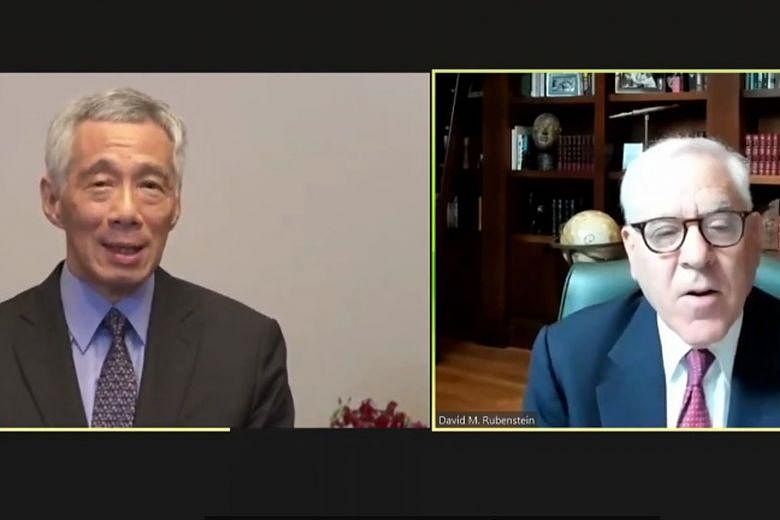SINGAPORE - Singapore is likely to see negative economic growth of minus three or four per cent, or more, this year, as a result of the two-month circuit breaker and ongoing Covid-19 pandemic, said Prime Minister Lee Hsien Long on Tuesday night.
But Mr Lee stressed that his focus is not on the exact growth figure.
"The key thing is: Which parts of the economy can you preserve and operate normally, and which parts have to be triaged and transition into new activities or new business models," he said."And which parts will take some time to come back, and you've got to keep them sort of in suspended animation, until things come back to normal."
This latter category includes sectors such as travel and air transport, Mr Lee said at a virtual dialogue held by the Atlantic Council, an American think tank.
"We have to try our best to keep those capabilities intact, so that when things come back to normal again, once again SIA (Singapore Airlines) will be flying, and once again, we will be the best airline in the world."
The Prime Minister was being interviewed by Carlyle Group's co-founder David Rubenstein for the Atlantic Council Front Page programme, which features a series of virtual conversations with top leaders from around the world.
During the session, PM Lee was asked for his take on US-China relations, Singapore's response to the pandemic, and whether he was happy with the results of the July 10 general election.
"We are satisfied with the results," Mr Lee replied. "We had hoped for a higher popular vote, but in the circumstances we think it's a clear mandate, and we will make the most of it and serve Singapore as best we can in the next five years." The People's Action Party got 61.23 per cent of the popular vote, about four percentage points below the 65 per cent its leaders had hoped to obtain.
On the question of large numbers of Covid-19 cases in foreign worker dormitories, Mr Lee said the situation was now under control.
"But then, of course, comes the challenge of keeping the peoplecontinuing (to work) safe and clean, and allowing them to go back to work without once again starting a cycle of infection," he said.
One viewer asked how Singapore's casinos and its national carrier have been coping with the economic fallout of the pandemic.
Mr Lee replied that both are currently operating, although the flow of tourists to casinos has dwindled, as have the passenger loads on SIA's aircraft. "We are actively trying to develop green lanes and safe travel arrangements with other countries where Covid-19 is under control, so that we can restart the traffic," he said.
Mr Rubenstein also asked about the fact that salaries drawn by government officials are comparable to the private sector, and whether this is a contributing factor to the lack of corruption in Singapore.
Mr Lee responded that it was one of several factors. "But we still have this problem, and from time to time we come across officials at many levels - some quite high ones, occasionally - who have succumbed to temptation and we have to act against them zealously," he said.
"Even if it's embarrassing or awkward for us, we have to do it. Because if we didn't do it, then that's the end of the system, and you'll not be able to maintain the integrity and the reputation which we have built up over so many years."


